Search Results
Showing results 21 to 40 of 41
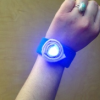
High Tech Fashion
Source Institutions
In this technology activity, learners build simple circuits, design soft circuits using conductive thread, and then sew switch-activated circuits.

Two Button Buzzer Circuit
Source Institutions
In this activity, learners explore an everyday situation, where either of two or more buttons can ring a buzzer.
Happy City
Source Institutions
Make a model city happier with LEDs, circuits, motors, and batteries! Groups can think, discuss, design, and build what would make a community happy. Kids can work as part of a team or on their own.
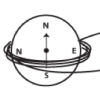
How Do We Convert Mechanical Energy into Electrical Energy?
Source Institutions
In this activity, learners use a compass, powerful magnet, and copper magnet wire to build a special generator known as a dynamo.

Forward-Reverse Switch
Source Institutions
In this activity, learners build a switch to turn electrical circuits on and off.

Using Ohm's Law to Build a Voltage Divider
Source Institutions
In this activity, learners apply Ohm’s Law to construct voltage divider circuits. Learners discover how to read resistor codes and calculate resistor values.

Static Water
Source Institutions
In this activity, learners will use static elecricity to bend a stream of water without touching it. Learners will explore physics and cause and effect through this activity.
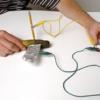
Kosher Dill Current: Make Your Own Battery!
Source Institutions
This is an activity that demonstrates how batteries work using simple household materials. Learners use a pickle, aluminum foil and a pencil to create an electrical circuit that powers a buzzer.
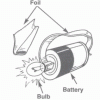
Bright Lights
Source Institutions
In this activity about electricity, learners imagine that they are out in the wilderness and it is getting dark. Their task is to use the materials supplied to build a simple flashlight.

Wind Power: Creating a Wind Generator
Source Institutions
This lesson challenges groups of learners to design and construct a wind generator with the most electrical output.

As the Rotor Turns: Wind Power and You
Source Institutions
In this engineering activity, learners will get acquainted with the basics of wind energy and power production by fabricating and testing various blade designs for table-top windmills constructed from

Electricity: Fruit Batteries
Source Institutions
In this activity, learners create a battery from fruit. This activity helps learners explore electricity, electrochemistry, and series circuits as well as the process of scientific inquiry.
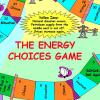
Energy Choices Board Game
Source Institutions
This board game teaches learners about energy decision making. Players select cards that determine the transportation and home design that will influence their expenses as they play.
Waves: An Alternative Energy Source
Source Institutions
In this data analysis and environmental science activity, learners evaluate the feasibility of wave energy as a practical alternative energy source using ocean observing system (OOS) buoys.

Community Wind Project
Source Institutions
In this thought-provoking activity, learners plan a hypothetical project to build and operate wind turbines in their community.

Cable Car
Source Institutions
In this activity, learners string a line across the room and build cable cars that can move from on end to the other.

The Power of Graphene
Source Institutions
This lesson focuses on graphene and its electrical properties and applications.
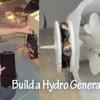
Build Your Own Hydroelectric Generator
Source Institutions
Learners follow directions to construct a water-powered electrical generator using a turbine made from plastic spoons.
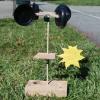
Weather Vane and Anemometer
Source Institutions
In this meteorology activity, learners construct simple devices to measure the direction and speed of wind.

Light Bulb Challenge
Source Institutions
In this activity, learners explore the difference between compact fluorescent light (CFL) bulbs and traditional incandescent bulbs.
